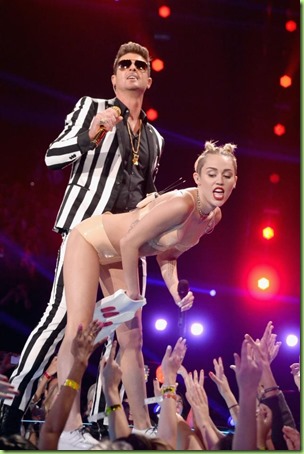 Daddy’s little skank: nice job Billy Ray
Daddy’s little skank: nice job Billy RayPosted on 08/28/2013 10:11:22 AM PDT by NOBO2012
I wasn’t going to comment on the bizarro performance by Miley Cyrus at the MTV awards show, butt this morning I asked myself, “should I be the only person exercising such restraint?”
 Daddy’s little skank: nice job Billy Ray
Daddy’s little skank: nice job Billy Ray
Especially when I found out that her performance was not only raunchy, butt racist as well. (SNIP)
So in an attempt to make reparations for Miley’s offense against the race baiters, I will spend a few minutes today commemorating the sentiments of the truly inspirational Dr. Martin Luther King. While doing so, I will also take the opportunity to reflect on just how far we’ve come from the dream he spoke of so eloquently 50 years ago today.(SNIP)
I can’t imagine that he’d be pleased to find out that everything he stood for and fought for in the pursuit of equality has devolved into racial identity politics. And along with that devolution racism, too, has reversed poles so that now we’re right back where we started except on the other side. As Doonesbury foresaw:
“How do I bring people together? How? Maybe a luau of some kind. What is it Campbell?”
“I just met with the African American Student Council, sir…
(Excerpt) Read more at michellesmirror.com ...
I have a scheme...
Why not post it all here?
NARRATION---MLK Jr. could hardly believe his eyes when he left the segregated South as a teenage college student to work on a tobacco farm in Connecticut (then a common practice for Southern college students who wanted summer jobs).
“On our way here we saw things I had never anticipated to see,” he wrote his father in June 1944. “After we passed Washington, DC, there was no discrimination at all. The white people here are very nice. We go to any place we want to and sit any where we want to.”
MLK spent that summer working in a tobacco field in the Hartford suburb of Simsbury with white and black students. That experience would influence his decision to become a minister and heighten his resentment of segregation.
“It’s clear that this little town, it made a huge impact on his life,” said John Conard-Malley, a Simsbury High School senior who did a documentary with other students on King’s experiences in Connecticut. “It’s possibly the biggest thing, one of the most important things, people don’t know about Martin Luther King’s life.”
Until then, King was thinking of becoming a lawyer, Conard-Malley said. But after his fellow students at the tobacco farm elected him their religious leader, he decided to become a minister.
In his later application to Crozer Theological Seminary King wrote that he made the decision that summer “when I felt an inescapable urge to serve society. In short, I felt a sense of responsibility which I could not escape.” “Perhaps if he hadn’t come to Connecticut, hadn’t picked tobacco up here, hadn’t felt like a free person, hadn’t felt what life was like without segregation and been elected the religious minister, he may not have become such a leader in the civil rights movement,” he said.
In a letter to his mother, King marveled over a trip he took to Hartford. “I never thought that a person of my race could eat anywhere but we ate in one of the finest restaurants in Hartford,” King wrote. “And we went to the largest shows there.” He wrote of going to the same church as white people.
His new calling as a religious leader was emerging, too. “I have to speak on some text every Sunday to 107 boys. We really have good meetings,” he wrote.
In a speech in Hartford in 1959, King recalled how hot it was working on the tobacco field and how he looked forward to relaxing on weekends in Hartford. Byer says King and other students often worked in temperatures that reached 100 degrees or higher. The students, who were earning money to pay for college, made about $4 per day, Byer said. They lived in a dormitory built at the edge of the tobacco field.
That taste of freedom in New England ended as King returned home. When he got to Washington, he had to ride the rest of the way to Atlanta in a segregated train.
“After that summer in Connecticut, it was a bitter feeling going back to segregation,” King wrote in his autobiography. “I could never adjust to the separate waiting rooms, separate eating places, separate rest rooms, partly because the separate was always unequal, and partly because the very idea of separation did something to my sense of dignity and self-respect.”
Shortly before coming to Connecticut that summer, a Southern bus driver ordered MLK to give up his seat for a white passenger on the way to Atlanta.
King’s widow, Coretta Scott King, wrote in her memoir, “My Life With Martin Luther King Jr.” that her husband talked of the exhilarating sense of freedom he felt in Connecticut that summer.
Nice!!!
Disclaimer: Opinions posted on Free Republic are those of the individual posters and do not necessarily represent the opinion of Free Republic or its management. All materials posted herein are protected by copyright law and the exemption for fair use of copyrighted works.